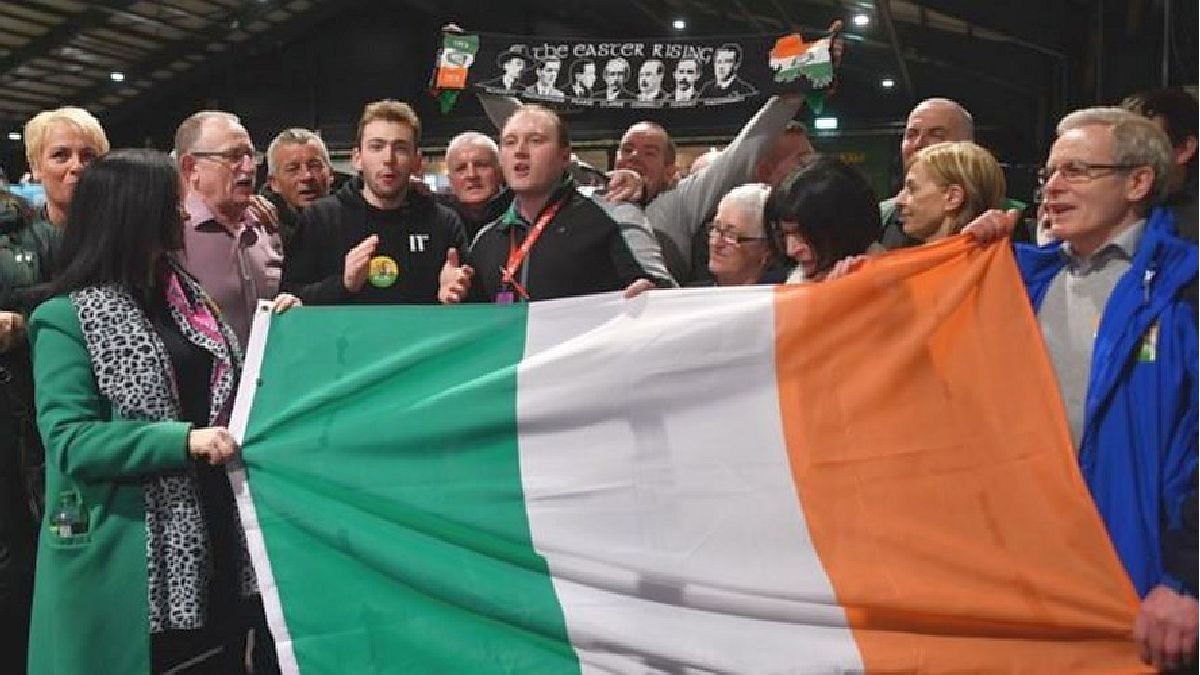To understand the economistic logic that clearly ‘wears’ any hint of religious ideologization (with an empty refrigerator there is no good god), it is not enough to make the ‘great Argentina’ and blame only exogenous variables. It is that beyond the pandemic – the local economy contracted 9.6% in 2020 -, or the conflict between Ukraine and Russia that leads to an inflationary process combined with a significant shortage of certain key goods (such as food and hydrocarbons). ), the new generations of Protestants and Republicans who seek to forge a peaceful coexistence – such as the moderates of the Social Democratic and Labor Party (SDLP), or the Alliance Party (non-denominational or linked to either of the two communities) -, daily experience the negative consequences of the endogenous Brexit (against which the Northern Ireland majority voted, since 56% opted for the STAY -), such as the suffocating customs controls through inspections related to safety or hygiene, or even the additional costs (fees and tariffs) that have been established for the goods that are sent to and from Great Britain.
“It would normally take a few days to get a box of seeds from England to Northern Ireland,” explains the chairman of the Hillmount Garden Center company. “Now it takes four weeks for the paperwork and no carrier is willing to do it. Bringing a plant from England is a real nightmare, so we have decided to start buying plants in Europe”. It is that Northern Ireland, as part of the agreement between London and Brussels, continues to belong to the European Union. However, there is no Win-Win here: logistics costs are not the same as from the nearby and honest markets of the Kingdom countries.
On the other hand, and while the Protestant bloc bled to death in discussions about endless economic measures –many incomprehensible from rationality, except for the exceptional loyalty to the British Empire-, Sinn Fein, supported by the general aura (and boom) of European nationalisms (of all stripes), the end of classic bipartisanship, and the erosion of the traditional center party system, proposed an economic program with an emphasis on investment (especially in housing construction and transportation), public spending increasing to improve education and public health, higher taxes for the wealthiest, and a consumption shock. Regarding this last point, the victorious SF candidate, Michelle O’Neill maintained in Kirchnerist epic: “The public wants us to put money in their pockets to help them deal with the rising cost of living crisis.”
This economic program that has given strength to the victory of the SF, is highly counterproductive for neoliberal economists. Even more so when the latter present their beloved macro numbers as a counterpoint: the production of the Northern Ireland economy reached a maximum in 13 years during 2021, with economic growth of 6.2% year-on-year. For the current 2022, a no less interesting number of around +4% is expected.
This is not only due to the positive results of the post-pandemic (among other factors because various groups of workers could continue working from their homes, as well as being a country with a significant number of state employees), but also because In addition, its iconic service sector (especially in the various engineering areas) and the commercial sector were strengthened, mainly based on a greater technology of administration, logistics, and purchase-sale processes. It is the preeminent logic in the economic structure of the most developed world: more services, commerce, and high-tech industries; less added value through the less productive sectors, but which absorb the former ‘industrial reserve army’.
There is no doubt that, in line with what is happening in vast regions of the planet, jobs will continue to be lost in lower-productivity industries, in line with the reticent investment in physical capital for low- and medium-complexity manufacturing. On the other hand, if an improvement is not made in the educational system that allows reducing the number of early school dropouts and increasing the number of graduates, the fight to get out of the ‘low wage trap’ will be lost. Needless to say, if the interest bid continues to be won by concentrated economic groups.
But precisely O’Neill promised the ‘great economic change’, leaving aside – surprisingly for many – the historic demand for the reunification of the island. Until election day, the latter was ‘the taboo subject’; Nevertheless, Not even 24 hours had passed after the confirmation of the victory for the winning candidate to maintain that “she trusts that there will be a referendum within a maximum period of five years.”
His speech should not be surprising: it is just one more replica of the countless historical examples of successful candidates for the highest executive positions. But let’s remember that Fidel Castro he never said that he was going to establish socialism until the revolution was completed and the regime formally installed. Or even our former 1990s president, who went down in history with his famous phrase “If I said what I was going to do, no one voted for me.”
For this reason, we must not be naive: bearing the imprint of a hundred-year history of tensions, the economic variable is surely only the basis for the consequent ulterior objective that, like a momentarily dimmed flame, hopes to become at some point a fire of fire. difficult containment. On the other hand, knowing this almost certainly self-fulfilling prophecy, reunification is not going to be easy: on the one hand, the Good Friday agreements indicate that a consultation should be held when “it is clear that it is the desire of the majority”. On the other hand, the Republic of Ireland would have to give the go-ahead. After all, for many it would be the one to ‘pay the bill’ for its positive differential in quality of life, as West Germany did with its communist neighbor to the east three decades ago when the Berlin Wall fell.
Finally, we cannot forget the United Kingdom as the other partner under the current exchange of interests. Boris Johnson himself called on all the leaders of Northern Ireland to unite to form a local Executive that guarantees the “stability” of the British province. It is not a thing that the status quo will crack, in a world that is collapsing between war and scarcity, where London clearly requires a cohesive empire to face the geopolitical challenges of the future.
Beyond all the above, Sinn Fein now has the responsibility of co-governing with the Protestants, but this time with the baton. Comply with what was promised, show that they are not the same as their opponents, persevere in carrying out an economic program with a strong redistributive tint that allows balancing a very complex socio-economic scenario for the current daily life of the majority of Northern Ireland. Satisfy citizen demands so that Sinn Féin’s victory is not just symbolic; although as those nostalgic for the IRA often say, in Ulster symbols are everything.
And to close without going so far, we can say that our house is also an example of this. If the current government wants to be reelected, it must first and foremost prop up the economy, the mother of all battles, urgently lowering the runaway inflation that afflicts most Argentines. It is that, just as it happens in Northern Ireland and unlike what much of our history indicates, with the Peronist liturgy it is no longer enough.
Economist and Doctor in International Relations. Twitter: @KornblumPablo
Source: Ambito




